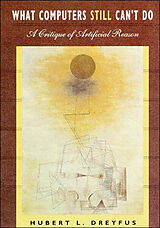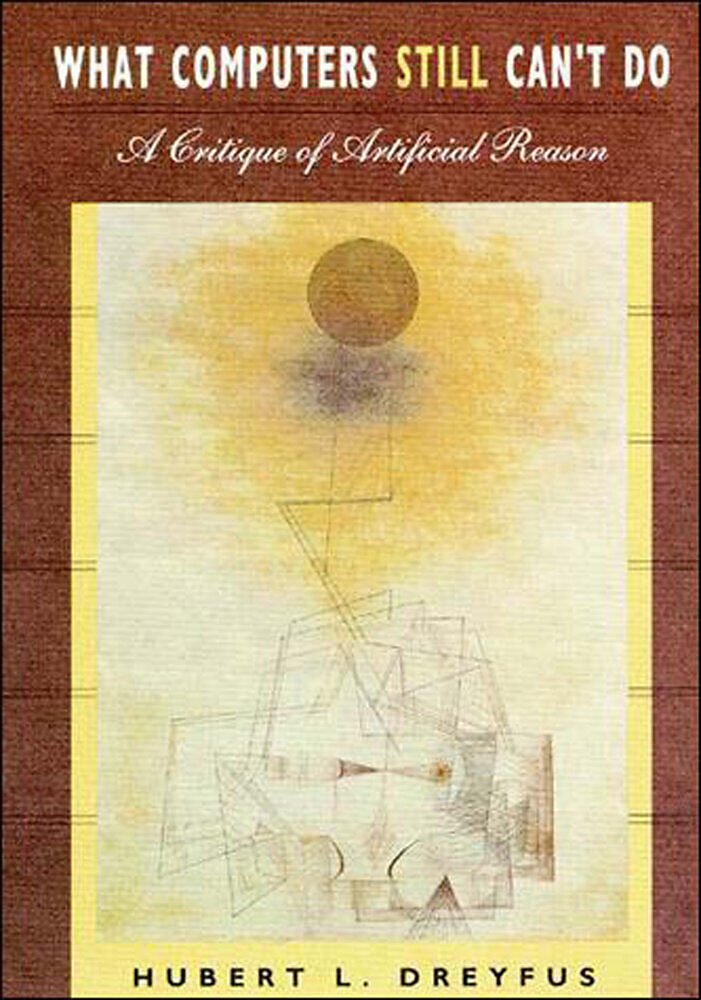What Computers Still Can't Do
Einband:
Kartonierter Einband
EAN:
9780262540674
Untertitel:
A Critique of Artificial Reason
Autor:
Hubert L. Dreyfus
Herausgeber:
MIT Press
Anzahl Seiten:
410
Erscheinungsdatum:
30.10.1992
ISBN:
0262540673
For this edition of his now classic book, Dreyfus has added a lengthy new introduction outlining these changes and assessing the paradigms of connectionism and neural networks that have transformed the field
Informationen zum Autor Hubert L. Dreyfus is Professor of Philosophy at the University of California at Berkeley. Klappentext When it was first published in 1972, Hubert Dreyfus's manifesto on the inherent inability of disembodied machines to mimic higher mental functions caused an uproar in the artificial intelligence community. The world has changed since then. Today it is clear that "good old-fashioned AI," based on the idea of using symbolic representations to produce general intelligence, is in decline (although several believers still pursue its pot of gold), and the focus of the Al community has shifted to more complex models of the mind. It has also become more common for AI researchers to seek out and study philosophy. For this edition of his now classic book, Dreyfus has added a lengthy new introduction outlining these changes and assessing the paradigms of connectionism and neural networks that have transformed the field. At a time when researchers were proposing grand plans for general problem solvers and automatic translation machines, Dreyfus predicted that they would fail because their conception of mental functioning was naive, and he suggested that they would do well to acquaint themselves with modern philosophical approaches to human beings. What Computers Can't Do was widely attacked but quietly studied. Dreyfus's arguments are still provocative and focus our attention once again on what it is that makes human beings unique. Zusammenfassung When it was first published in 1972, Hubert Dreyfus's manifesto on the inherent inability of disembodied machines to mimic higher mental functions caused an uproar in the artificial intelligence community. The world has changed since then. Today it is clear that "good old-fashioned AI," based on the idea of using symbolic representations to produce general intelligence, is in decline (although several believers still pursue its pot of gold), and the focus of the Al community has shifted to more complex models of the mind. It has also become more common for AI researchers to seek out and study philosophy. For this edition of his now classic book, Dreyfus has added a lengthy new introduction outlining these changes and assessing the paradigms of connectionism and neural networks that have transformed the field. At a time when researchers were proposing grand plans for general problem solvers and automatic translation machines, Dreyfus predicted that they would fail because their conception of mental functioning was naive, and he suggested that they would do well to acquaint themselves with modern philosophical approaches to human beings. What Computers Can't Do was widely attacked but quietly studied. Dreyfus's arguments are still provocative and focus our attention once again on what it is that makes human beings unique. ...
Klappentext
When it was first published in 1972, Hubert Dreyfus's manifesto on the inherent inability of disembodied machines to mimic higher mental functions caused an uproar in the artificial intelligence community. The world has changed since then. Today it is clear that "good old-fashioned AI," based on the idea of using symbolic representations to produce general intelligence, is in decline (although several believers still pursue its pot of gold), and the focus of the Al community has shifted to more complex models of the mind. It has also become more common for AI researchers to seek out and study philosophy. For this edition of his now classic book, Dreyfus has added a lengthy new introduction outlining these changes and assessing the paradigms of connectionism and neural networks that have transformed the field.At a time when researchers were proposing grand plans for general problem solvers and automatic translation machines, Dreyfus predicted that they would fail because their conception of mental functioning was naive, and he suggested that they would do well to acquaint themselves with modern philosophical approaches to human beings. What Computers Can't Do was widely attacked but quietly studied. Dreyfus's arguments are still provocative and focus our attention once again on what it is that makes human beings unique.
Inhalt
Part 1 Ten years of research in artificial intelligence (1957-1967): phase I (1957-1962) cognitive simulation - analysis of work in language translation, problem solving, and pattern recognition, the underlying significance of failure to achieve predicted results; phase II (1962-1967) semantic information processing - analysis of semantic information processing programmes, significance of current difficulties. Part 2 Assumptions underlying persistent optimism: the biological assumption; the psychological assumption - empirical evidence for the psychological assumption - critique of the scientific methodology of cognitive simulation, "A Priori" arguments for the psychological assumptions; the epistemological assumption - a mistaken argument from the success of physics, a mistaken argument from the success of modern linguistics; the ontological assumption. Part 3 Alternatives to the traditional assumptions: the role of the body in intelligent behaviour; the situation - orderly behaviour without recourse to rulels; the situation as a function of human needs. Part 4 Conclusion - the scope and limits of artificial reason: the limits of artificial intelligence - the future of artificial intelligence.

Leider konnten wir für diesen Artikel keine Preise ermitteln ...
billigbuch.ch sucht jetzt für Sie die besten Angebote ...
Die aktuellen Verkaufspreise von 6 Onlineshops werden in Realtime abgefragt.
Sie können das gewünschte Produkt anschliessend direkt beim Anbieter Ihrer Wahl bestellen.
Loading...
Die aktuellen Verkaufspreise von 6 Onlineshops werden in Realtime abgefragt.
Sie können das gewünschte Produkt anschliessend direkt beim Anbieter Ihrer Wahl bestellen.
| # | Onlineshop | Preis CHF | Versand CHF | Total CHF | ||
|---|---|---|---|---|---|---|
| 1 | Seller | 0.00 | 0.00 | 0.00 |
